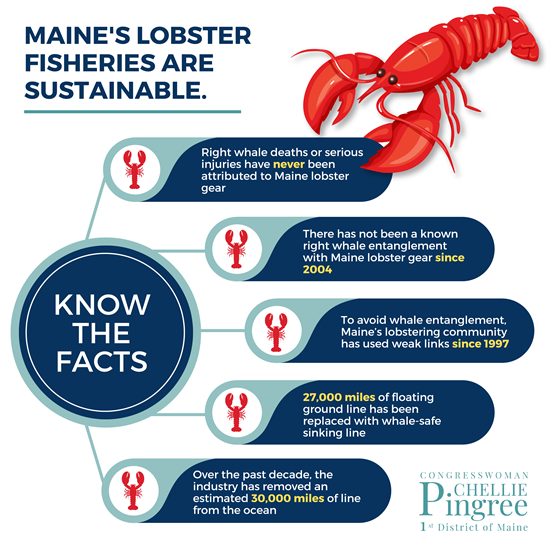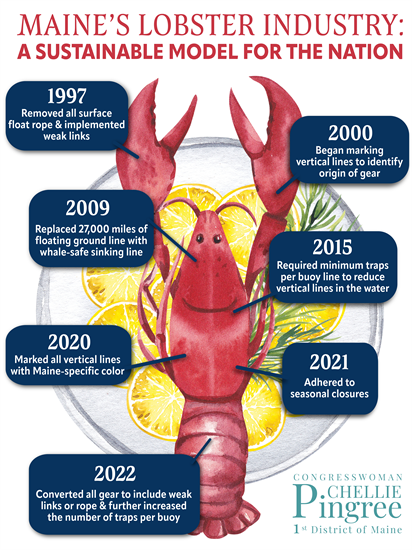Supporting Maine Lobstermen
|
Fisheries are an incredibly important part of Maine’s economy, heritage, and culture, and sustain entire communities along our coasts and beyond. From fighting to ensure our fishermen have access to working waterfronts to supporting the scientific research and stock assessments necessary to ensure accurate decision-making, I am working in Maine and DC to make our fisheries and coastal communities more sustainable in the face of numerous challenges, including climate change. 
Although there has never been a right whale death attributed to Maine lobster gear, misguided misguided actions have been proposed that would end lobstering in Maine, all based on the theoretical possibility that a right whale could be killed. Congresswoman Pingree and fellow members of the Maine Delegation and Governor Mills have been steadfastly opposed to undue burdens that would threaten the lobster fishery without meaningfully protecting whales
For 150 years, the Maine lobstering industry has adopted practices to sustain the fishery and the marine environment. Since 1997, it has repeatedly adopted practices to protect right whales, with measures including using weak links since 1997, gear marking since 2002, implementing sinking ground lines in 2009, reducing vertical lines in 2014, and removing an estimated 30,000 miles of line from the ocean. Lobstermen made these modifications, and according to NOAA Fisheries’ own data, they have worked—the Maine lobster fishery hasn’t been definitively linked to a right whale entanglement in 20 years and no deaths have ever been attributed to Maine lobster gear. At the same time, the population recovery of the right whale has been disrupted by mortalities definitively linked to climate change, ship strikes, and entanglements in Canadian waters. Nevertheless, the lobster industry has been forced to make dramatic changes and shoulder the cost of saving the right whales regardless of whether or not the right whale deaths can be linked to lobstering in the Gulf of Maine. Importantly, there are major deficiencies in current right whale monitoring efforts, making it difficult to determine whether and how whales might be traveling through the fishery. Recent studies have found that their primary food source has been steadily decreasing in Maine waters, migrating northward towards Canada, and whale sightings have declined accordingly. 
Still, a recent judicial order found the Maine lobster fishery out of compliance with the Endangered Species Act and Marine Mammal Protection Act, before there was time for the latest regulations to have even been evaluated. The judge ruled that NOAA Fisheries (NMFS) must issue a new rule by December 2024 that must entirely eliminate risk to right whales. Based on scarce scientific data, this would force the Maine lobster fishery to completely close, causing substantial uncertainty and economic impacts on the nearly 6000 lobstermen who make their living on the water and the thousands of additional related businesses that are a critical part of the lobster supply chain. Further, the fishery will be unable to achieve compliance without the development of new gear technology. According to NMFS, this technology will not be ready for implementation until 2030. Environmental groups have also acknowledged this timeline.
In addition, the Maine delegation secured additional investments, in this omnibus bill to support the right whale, including:
|

